Gin Card Game
Gin Card Game is a strategy game involving both luck and skill. (NOTE: Rummy is an easier version of the game that is suitable for 2 to 6 players, aged 8+.)
Age: Adults and older children
No. of players: 2
Equipment: One standard deck of cards (remove the jokers)
Time: 10+ minutes per hand; 3-6+ hands per game
Aim: To be the player with the highest score at the end of the game.
Subscribe to the RSS feed on the Navigation Bar over to the left
or bookmark this site (top of the right column) and visit often.
In Gin Card Game, two players sit opposite each other. Decide on the number of rounds (generally 3 to 6, or more) or the time limit of the game. Both players then choose a card at random from the deck; the player with the highest card (with Aces as lowest card, Kings as highest card) becomes the dealer. (See the Glossary if you are confused about any card game terms. The Glossary will open in a new window.)
1. The dealer shuffles the cards and deals ten cards each, facedown, one at a time, beginning with their opponent. The remaining cards are placed facedown as a pickup pile in the centre of the table. The top card of the pickup pile is turned face up, next to the pickup pile, as a discard pile.
2. Players look at their cards and attempt to make melds of all the cards in their hand. A meld can be either;
- 3 or four cards of one number (e.g. 8♠ 8♣ 8♥ , or J♠ J♣ J♥ J♦ ),or
- a run of 3 or more cards of the same suit (e.g. A♣ 2♣ 3♣ 4♣). Note: An ace is always counted as a "one" in Gin Card Game; it is never counted above a king. (That is, Aces Low, not Aces High)
3. Player One can either pick up the top card from the discard pile (which they can see face up) or the top card from the pickup pile (which they cannot see since it is face down). They then choose any card from their hand (including the card they just picked up) to place on top of the discard pile face up, leaving them with their original number of cards.
4. Play continues with each player in turn choosing and discarding cards while trying to make melds of all the cards in their hand.
5. If all the cards in the pickup pile are used up, this hand of Gin card game is declared void with no scores and the same dealer deals again.
6. Each player tries to make a complete set of melds of their cards to win ("Going Gin" - see point 7) but they can also win by "Knocking" (point 8). In Knocking, a player can choose to end the game early by knocking on the table if they have ten points or less of deadwood. (Deadwood is any card that is not matched as part of a meld. Each card has its face value, with an ace worth one point and court cards (Jacks, Queens or Kings) worth ten points.) Knocking involves a greater risk but can gain a much higher score.
7. A player may only "Go Gin" during their turn. The opposing player must then place any melds on the table. The winning player scores 25 points plus the value of the losing player's deadwood.
For example;
- Player One 8♠ 9♠ 10♠ J♠ A♦ 2♦ 3♦ 5♥ 5♣ 5♦
- Player Two 7♠ 7♦ 4♥ 4♣ 4♠ 4♦ 10♥ J♥ Q♥ 6♣
Player One was able to win by "Going Gin" with three melds:
- 8♠ 9♠ 10♠ J♠
- A♦ 2♦ 3♦
- 5♥ 5♣ 5♦
Player Two could not "Go Gin" and could not "Knock" (since their Deadwood was over 10 points):
- 7♠ 7♦ 6♣ - Deadwood; 7 + 7 + 6 = 20 points
- 4♥ 4♣ 4♠ 4♦ - A meld
- 10♥ J♥ Q♥ - A second meld
Thus, Player One won this hand of Gin card game and scored 25 + 20 points = 45 points.
8. While playing Gin Card Game, either player can "Knock" during their turn, after they have picked up a card but before they discard. They knock on the table, discard one card facedown and place their hand face up in front of them. The opposing player then places their hand on the table but can place any unmatched cards on the Knocking player's melds if they match. The value of each player's Deadwood is then counted.
9. (a) If the Knocking player's deadwood value is less than their opponent's deadwood value, the Knocking player scores the difference between the values.
For example;
- Player One K♠ K♦ K♥ J♣ J♠ Q♦ Q♥ 2♥ 6♦ 6♣
- Player Two 10♥ 10♠ 10♣ A♦ A♥ A♣ 5♥ 5♣ 5♦ 6♥
Player Two was able to "Knock" since their deadwood was only six (6♥ ):
Player One was able to place their meld (K♠ K♦ K♥ ) on the table but the remaining cards were deadwood. The value of Player One's deadwood (J♣ J♠ Q♦ Q♥ 2♥ 6♦ 6♣) was 10 + 10 + 10 + 10 + 2 + 6 + 6 = 54 points.
Thus, Player Two won this hand of Gin card game and scored 54 - 6 points = 48 points.
(b) If the Knocking player's deadwood value is more than their opponent's deadwood value, the opposing player scores 25 points plus the difference between the values.
For example;
- Player One K♠ K♦ K♥ K♣ J♣ J♠ J♦ 5♠ 10♦ 2♥
- Player Two 10♥ 10♠ 10♣ A♦ A♥ A♣ 5♥ 5♣ 5♦ 6♥
Player Two chose to "Knock" since their deadwood was only six (6♥ ):
Player One was able to place his two melds on the table and his 5♠ and 10♦ in Player Two's melds, with only the 2♥ as deadwood; a value of only two.
Thus, Player One won this hand and scored 25 + (6 - 2) = 29 points.
10. At the end of the game (after the number of hands is completed or at the end of the time limit chosen before the game) the scores are added together. When either player scores a total of 100 points or more, they receive an extra 100 points. If their opponent failed to score any points, the winning player's score is doubled. Otherwise, both players receive an additional 25 points for each hand they won. The player with the highest score wins Gin Card Game.
If Gin Card Game is a little too difficult, try Rummy which is easier to play, especially for children.
| Click on the links below for more Card Games such as ... | |
| More card games for two players |
Card games for children of all ages |
| Crazy Eights Go Fish Hockey Card Game Rummy |
Snap Old Maid My Ship Sails Clock Patience (for one player) |
|
Do you have a favourite Card game that you want to share with all our readers? You can share YOUR Card game and/or check out other readers' favourite Card games. It's easy! Just click on this share YOUR Card game link and follow the instructions. | |
Thank you for visiting our website!
Parlor Games | Board Games | Traveling Games | Tile (Domino) Games
Card Games | Worldwide Games | Outdoor Games | Dice Games | Word Games
Christmas Games | Easter Games | Thanksgiving Games
Family Reunion Games | Valentines Games
Great Gift Ideas
 Cashflow |
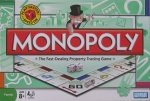 Monopoly |
 Family Trampoline |
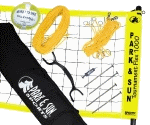 Volleyball Set |
 Table Tennis Table |
Ebooks
 The Family Guide to Party Games |
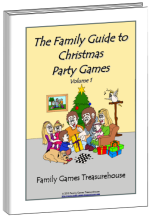 The Family Guide to Christmas Games (Volume 1) |
 The Family Guide to Christmas Games (Volume 2) |
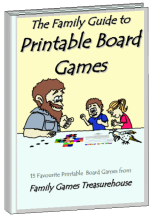 The Family Guide to Printable Board Games |
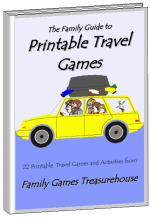 The Family Guide to Printable Travel Games |


